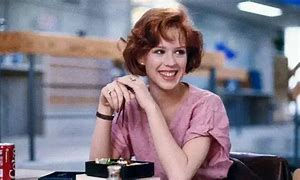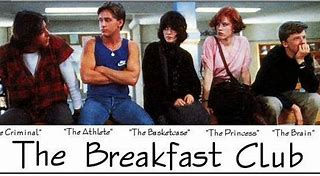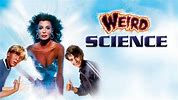Why The Breakfast Club Is John Hughes Most Iconic Film
- Jasmin Rowcliffe
- Apr 23, 2025
- 3 min read
Updated: Apr 29, 2025

Longing for Acceptance is shown throughout all the characters in some shape or form. The two easiest ones to identify are John and Brian. John is a rebel who longs to be accepted by his peers by acting like the funny/outgoing rebellious kid. Brian is a nerdy guy who has no luck with making friends or getting into a relationship because it’s against the social norm. My favorite scene in this film is the scene where Bender argues with the detention teacher, Paul Gleason.

That brings us into social expectations! Social expectations play a big role in contributing to the stereotypes in this film. It’s not socially accepted for a popular/gorgeous girl to date a nerdy guy, and this goes the other way around too. The difficulty of dealing with peer-pressure is also represented. One of the biggest peer-pressure topics with teenagers is if they have their virginity or not, and most teenagers find it uncool if you do. So, in the film when John asks Brian if he’s a virgin, he tries to deny it because he wants to be cool. Teenagers often try to pressure their partner or friends to have sex because it is seen as “cool.” In the film, it seemed as though they were trying to demonstrate how difficult peer-pressure is.

The Breakfast Club's performances are based around stereotypes in High School. Each main character in this movie represents a stereotype. For instance, Claire is given the princess stereotype. Claire is seen as this innocent and cool girl. The reason she got stuck in detention is for skipping class to go shopping. Claire’s boyfriend, Andrew, is popular and a classic jock. Andrew represents the athlete stereotype and he’s a part of the wrestling club. Like any other stereotypical jock, Andrew tries to act like he’s top notch. Brian is the stereotypical nerdy kid in school. While being a part of the mathletes club, Brian also goes out of his way to make himself seem cool to impress Claire. Despite Brian’s efforts, Claire is popular and would be shamed for dating a “nerd.” Ally is referred to as a “basket case” based on how she acts. Ally admits to drinking alcohol any chance she gets and is also seen to be rebellious. However, the real rebel that makes himself seen is Andy. Andy represents the criminal and rebel in the film. Andy has an abusive father, and this explains why he behaves the way he does. Andy feels like the only way to be seen in school is by going out of his way to rebel.
The Breakfast Club influenced a few things. For starters, the big thing it influenced was teen dramas. Other filmmakers were interested in the way they used their characters to create drama. Another thing this influenced was a better understanding of teenage struggles. All the teenagers in the film had their own individual struggles. The last thing it influenced was really defining the teenage stereotypes in the film. For instance, the cliche jock character and preppy female character.

On Rotten Tomatoes, critics gave The Breakfast Club an eighty-seven percent rating. While most critics leave a positive review, other critics have different opinions. For instance, Danielle Stolzman says, “No list of the best teen films or best films of the 1980s is complete without including The Breakfast Club.” However, other critics believe The Breakfast Club is overrated because the film mostly takes place in one room. This film works extremely well still today because it shows how hard being a teenager can be when trying to meet every social expectation in the book while still trying to figure out who you are. The storytelling in this film revolves around the teenagers figuring out who they are by showing their personalities and interactions with each other. For instance, we can assume Brian is unpopular based on his interactions with John, Andrew, and Claire. The film uses the issue of being in detention to get to know the characters personally.






Comments